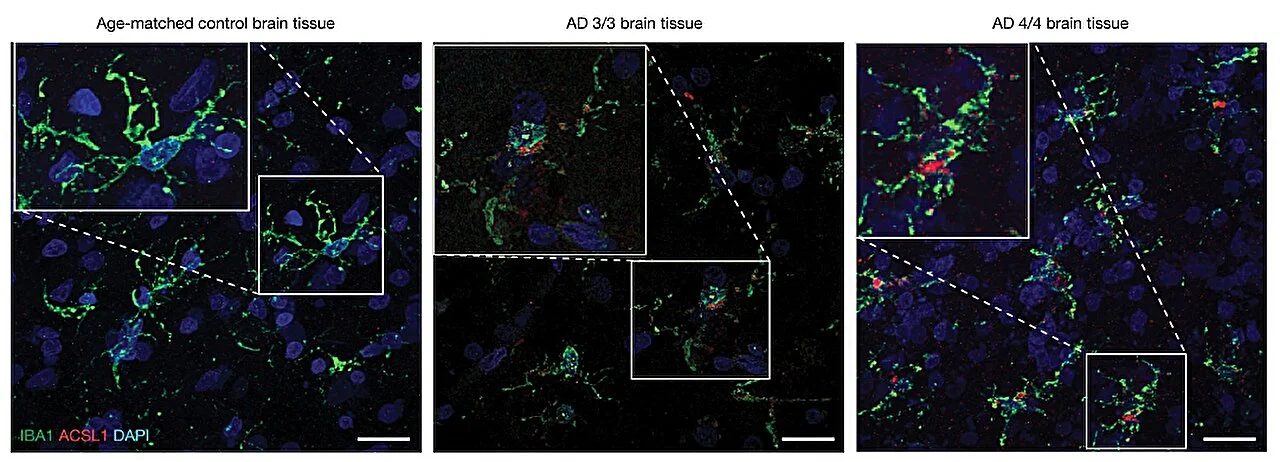- cross-posted to:
- science@beehaw.org
- cross-posted to:
- science@beehaw.org
A team of neurologists, stem cell specialists and molecular biologists affiliated with several institutions in the U.S. and led by a group at Stanford University School of Medicine has found evidence that the root cause of Alzheimer’s disease may be fat buildup in brain cells. The study is published in the journal Nature.
Never skip brain day at the gym
By… headbanging?
-
Synaptic Sprint: High-intensity interval training focusing on quick bursts of movement to stimulate neural connections.
-
Dendritic Dance: A choreographed dance routine designed to enhance coordination and promote neuroplasticity.
-
Axonal Agility: A series of agility drills and plyometric exercises to improve nerve impulse transmission and reflexes.
-
Cerebral Circuit: A circuit training workout targeting different areas of the body to stimulate overall brain function.
-
Neuronal Nirvana: Mindfulness meditation and yoga sequences aimed at reducing stress and promoting mental clarity.
-
Myelin Marathon: Endurance-based exercises such as running or cycling to support the growth and maintenance of myelin sheaths around nerve fibers.
-
Neurogenesis Nudge: A combination of cardiovascular exercise and strength training to encourage the production of new brain cells.
-
Glial Glide: Low-impact aerobic activities like swimming or rowing to support brain health by promoting blood flow and oxygenation.
-
Cortical Calisthenics: Bodyweight exercises focusing on balance, coordination, and stability to challenge cognitive function and motor skills.
-
Synapse Stretch: Stretching and flexibility exercises to enhance neural plasticity and prevent stiffness in the nervous system.
-
Alzheimer’s is beginning to be understood as Type 3 Diabetes and will be more and more commonly be known as such. Meat (and fat) is making us sicker than people realize but is also easy to cut out or cut back on.
“Conclusions: Altogether, the results from these studies provide strong evidence in support of the hypothesis that AD represents a form of diabetes mellitus that selectively afflicts the brain.”
Link 1: Alzheimer’s Disease Is Type 3 Diabetes–Evidence Reviewed: https://www.ncbi.nlm.nih.gov/pmc/articles/PMC2769828/
“In studies across 11 countries, fat consumption appeared to be most closely correlated with the prevalence of Alzheimer’s disease, with the lowest fat intake and Alzheimer’s rates in China to the highest fat intake and Alzheimer’s rates in the United States.”
Link 2: Preventing Alzheimer’s Disease with Diet: https://nutritionfacts.org/blog/preventing-alzheimers-disease-diet/
Meat doesn’t cause it (correlation, not causation), excess sugar does.
Meat is satiating, eating protein and fat make you feel full.
Sugar causes fluctuations in insulin levels that make you hungry even when your caloric needs are met. Excess sugars go to the body’s reserves of glycogen until they are full, then they must be used or converted to fat for storage. This insulin-driven fat storage is the problem and the solution is to eat much less sugar to break the cycle. Allow your body to use your glycogen reserves so it has room to temporarily store the next meal rather than sending it to semi-permanent fat storage. Exercise helps this balance by using up reserves but “you can’t outrun your fork”.
Edit: nutritionfacts exists explicitly to promote a plant-based diet. They may be a good source for information but that bias must be considered.
https://nutritionfacts.org/about/
We also disseminate fact-based information through social media on the benefits of a whole food, plant-based diet for wellness, disease prevention, healthy weight management, and longevity
Meat is satiating, eating protein and fat make you feel full.
Wrong. Volume makes you full.
That is oversimplified and it does not change my argument at all.
Satiety is both physical and hormonal, so volume and fat can make you full but insulin can override that.
I can eat way more volume of carrots than brisket because fat is satiating. A small portion of fatty meat makes me feel full even though my stomach volume is not nearly capacity.
https://pubmed.ncbi.nlm.nih.gov/15767618/
https://www.ncbi.nlm.nih.gov/books/NBK53550/
A study has shown that oral stimulation with different fats by modified-sham-feeding (MSF) resulted in increased feelings of satiety compared with water in human subjects, with linoleic acid showing the strongest response (Smeets and Westerterp-Plantenga, 2006). On the other hand, sham feeding a high-fat cake increased food intake at the next meal compared to nonfat cake in restrained eaters (Crystal and Teff, 2006).
Without any volume ingested, fat increases satiety but fat+sugar reduces it.
I can eat an infinite volume of popcorn and not feel full
In the aluminum shop they told me breathing in the dust would give me Alzheimer’s. I’m now wondering how that even works.
How what works?
Many years ago a study found increased aluminium buildup in the brain of Alzheimer patients. Since then it has been linked as a possible cause or contributor.
Many doors can lead to the same destination. Fat buildup might be one of several natural ways to develop Alzheimers but aluminum shavings may do something similar.
This brings to mind the anecdote that Lou Gehrig probably didn’t have Lou Gehrig’s disease. As we learned more, we found other diseases with similar symptoms.
Yeah, but dat brain tho





